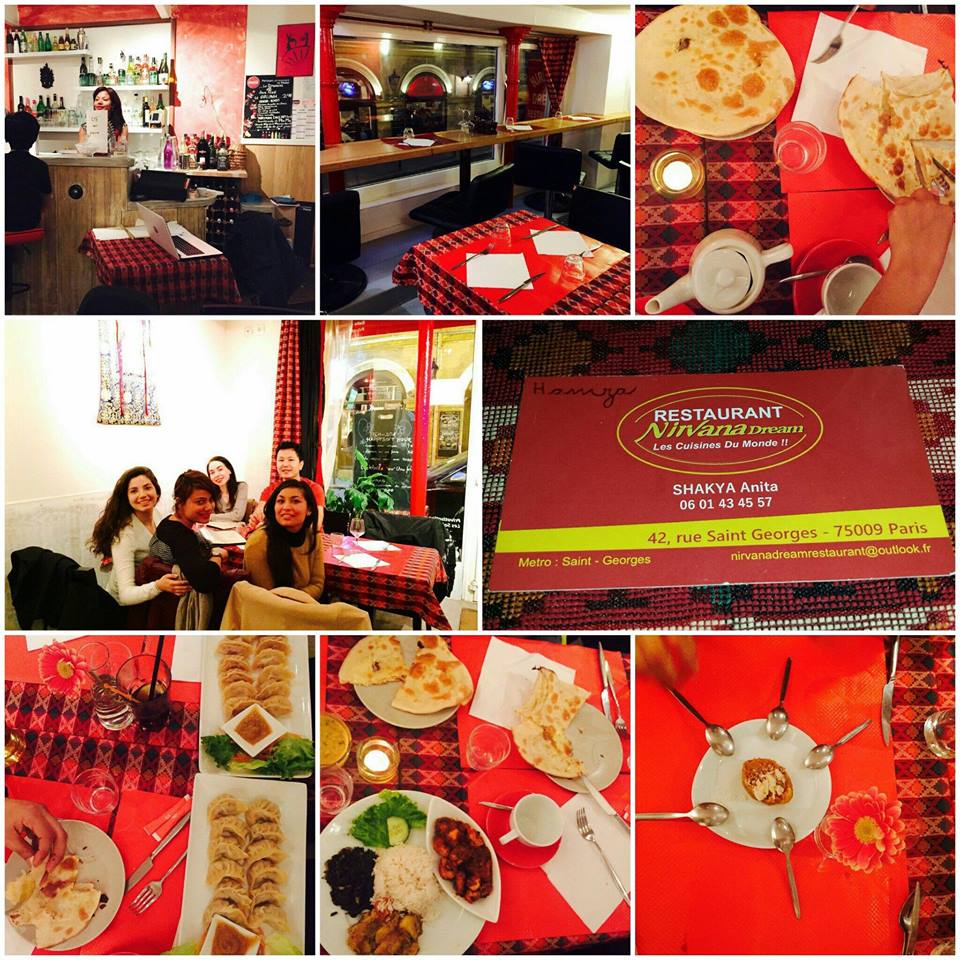
With wistful eyes she looks at her Paris-born son.
I want him to have it easier than I did. I hope that he will never have to lose time like I did.
On a weekday in late April, I am walking through one of the plush theater neighborhoods of Paris, to the bottom of a slope cascading with posh restaurants. I am on the way to meet a friend I met for the first time at the residence of the Nepali Ambassador in Paris. It was after the earthquake of April 2015. Each of us in that room were hungry for an outlet for the anxiety and helplessness we collectively felt, guilty for our safety, scared for our loved ones. I remember the small piece of paper she carried in one hand, full of ideas she had on how to contribute. Despite frequent interruptions and requests to end the meeting quickly, she made sure that every item on that list was heard before the meeting could be adjourned. Her determination struck me even then. And instinct told me that there was something else brewing in Anita’s life.
And I was right. In February, she and her husband, Roman, opened a Nepali restaurant in this neighborhood. Like all upscale restaurants, it has adopted the French mantra of ‘less is more’, looking deceptively unassuming, highlighted only by a red awning. But like many places in Paris, it has its own set of secrets.
A hundred years ago, it was Auguste Renoir’s studio, before being converted in a massage salon, and then a restaurant that served food from all around the world where many artists and film castings took place. Now it has become something new again, like a phoenix rising from the ashes.
The door opens to the smell of steaming momos. Nepali instrumental music flirts with me like the meandering streets of Thamel. I gaze at the hanging brass bells fitted here and there that I have seen adorn many a gumba and temple. I feel like I have come home. Even the sight of two boys darting through the small tables covered in bright red dhaka, their feet banging up and down the stairs until one of them, shouts, ‘I’m bored!’ in fluent french, is familiar.
Felix Wenzel, whose name means ‘glorious light’ in latin, is her son. The boy with him is his ‘third best friend’. They have been practicing a dance routine downstairs, in a little room facing the kitchen where his father delicately moulds minced chicken into the flesh of dough.
Behind the bar, on the main floor, a young woman with pink eyeshadow is washing up glasses and plates.
Would you like some tea?
Her petite frame dressed in a black dress, Anita could pass for a twenty-year old girl that is just finishing up her first degree, without a defined idea of what she wants. And she knows it.
People see me as a small lady and they think they can get away with things. The cooks that we hire, try to give me advice instead of listening to me. They think they know everything because they come with experience from working in Indian restaurants. But I want my restaurant to be a Nepali restaurant with Nepali taste!
I sit at the corner table, set against the wall, facing the stairway going up to the third floor next to a hanging prayer wheel. The checkered red dhaka tablecloth is gorgeous. As Anita sets down a cup of steaming Tulsi tea, she tells me how she sew one for each of the tables herself, with a sewing machine. Pointing to the black curtains bordered with red, she tells me she made those herself too, out of Newari saris. She turns to her restless son and his friend.
Why don’t you sit down and draw?
Felix sighs but obeys. We are about to begin.
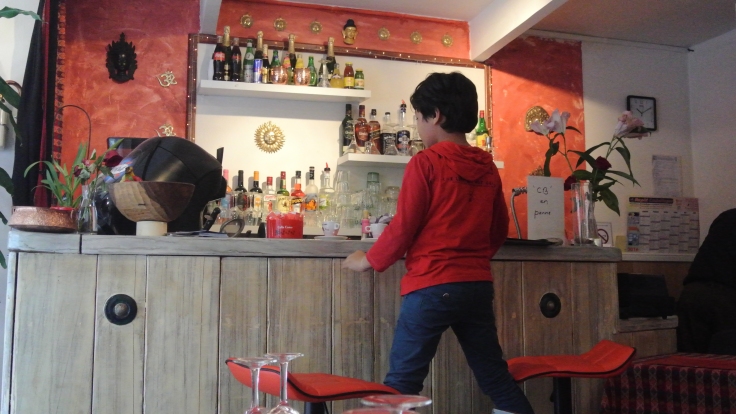
Or so I think. Until she she grabs the phone-I’m sorry I just need to speak to his – she points to the other boy – mom, to make sure she knows when to pick him up.
The boys convince her to let them use their ipads and computers. In resignation, she nods. And just like that, the whole mood changes, it becomes a haven of peace where her voice almost resonates as she speaks in Nepali. A few minutes later, putting the phone down, she switches to Newari, as her mother-in-law steps in, and she does the introductions between us. I find out they are all from Banepa, a town around 26 kilometers from Kathmandu.
So how did she become the president of this intimate palace?
Speaking to me in sprinkles of Nepali, English and French, she tells me how it all began.
A Way Out
Anita and Roman were neighbours in Banepa. In 2005, she had finished her Bachelors degree in computer science from Kathmandu university.
Everyday, for 3 to 5 years [since around 2001], there was a curfew. Because of that, everyone wanted to go abroad. People were targeting Thailand or the USA for their masters. My husband and I decided that we would go together wherever it was. The USA was very expensive and we could not pay the costs for that all at once. He told his family that he would leave but I didn’t tell mine because I was not sure we would be able to. We first went to Singapore. There, he took a course on Food and Beverages.
It was in Singapore that they met a broker who told them that Europe would be a good fit for them.
He said that we should go to Denmark and that he would give us a good price for it. We were very sojo, naive. We trusted him. He got us the ticket via India, upto France. I couldn’t read what was written on the papers he gave us, I think it was written in Sri Lankan. He told us that someone would pick us up in France and take us to Denmark. He came with us until the gate to see us off. As we got closer to the immigration counter, he said, ‘don’t talk to me’. He took our money and our passports. So when we got to France without our passports, we were stuck at the airport and when interrogated by the police, we tried to explain. After two days, the Red Cross came to see us. Through them, we were put in touch with the city police and realized that we could get political asylum as a result of what was happening in Nepal. When we came out of the airport, the organisation, France Terre d’Asile helped us get a permanent address.
But for three months, they did not have a fixed home, and were often separated.
I would often be in a female quarter somewhere. Sometimes, we slept on the chairs in the metro. But compared to Nepal, we felt safe. Noone was bothering us. He was with me and I felt secure.
In the evenings, they ate at the free soup kitchens that cater to the many who find themselves homeless in Paris, the restaurants du coeur.
After three months, the organisation charged with finding them a home, CADA, relocated them to a place in northeastern France, close to the borders of Germany and Luxembourg. They stayed in Metz for a year and a half.
We were the only Nepalis, surrounded by lots of Armenian refugees. We learned French by speaking to them, and the personel from CADA who invited us to celebrations. But the whole year, I spent all my days in the hospital. I had migraines and painful stomach aches. There was nothing to do there. Roman used to cook in between his visits to me everyday.
Although they were legalized rapidly, neither of them had the right to work. That is when they decided to come to Paris.
The momos are suddenly here, molded and steamed as fast as any restaurant in Kathmandu.
Please eat them while they are hot!
I oblige, musing at the contrast in culinary etiquette to Paris where everyone waits until everyone is served.
Anita’s wish is already realised. The taste cannot transport me anywhere but to Nepal. Fresh, hot, roundly plump, they taste just like momos at Nanglos Cafe. The chicken is succulent, the dough firm, the ginger and garlic perfectly apportioned.
She pours me a glass of white wine, pulling me back to France.
A Way In: Moving to Paris
Our first impression of Paris was that everyone was doing something. People were rushing to places. We decided to stay, sharing a room with a Nepali friend of ours who works as a carpenter. We stayed with him for two and a half years at La Courneuve [a suburb in the north east of Paris] until 2008.
Anita started working as a nanny. Roman got a job at a Japanese restaurant in the 17th arrondissement facilitated by the first president of the Non-Resident Nepalese Association, the NRN.
Without papers, the infamous titre de sejour, Anita could not get any other job. The French administration required her to have been in France for five years to apply for it. Her boss helped her continue her studies instead, and she completed her masters in marketing at one of France’s well-known business schools, INSEEC. But upon graduation, she could only work in places where employers were willing to declare they were hiring her, committing to pay a higher fees for it.
I asked them to do that if they liked my work.
And they did. So she did her rounds, in Nepali, Indian, Portuguese, Mexican, Creole restaurants…
Anita now has her Titre de Sejour. The hard lesson learned is this.
People should not waste time. Even a year. So much can be done in a year.
It is a feeling that her father-in-law echoes. For 25 years, he tells me that, he never closed his shop that sells TVs and watches. But this time he did, to come and visit Roman, Anita and Felix for two months, with his wife.
He reminds of my mother’s elder brother, my Thulo Mama, who carries the same delicate newari features. But it is more the rapid cadence of his speech and the way he calls me maiya, a term of endearment with no equivalent in any other language I know, that creates that feeling of familiarity. But unlike my mama, his Nepali is lilted with Newari, like a song, and he has an uncommon name for a Newar.
Hitler Sakya.
He smiles congenially in response to my irrepressible laughter. But contrary to my initial thought, it was not an ignorant assignment. He was given that name because his own father used to watch a lot of foreign films. For his father, this was the name of an important person, the man who wanted to be King of the World and who started World War II. It is a name he seems to have rebelled against, becoming a committed social worker with many an organisation. But it also served him well, getting him noticed opportunely, like this time he tells me about.
In the 1970s, the first toilets were to be installed in Banepa. The Nepali government was selling the materials for the building of toilets and I had filled out the requisite application to buy cement. There was a long queue in front of the building. When the staff saw ‘Hitler’ on the piece of paper, they laughed hysterically. The man in charge told me, don’t bother about standing in the queue, here is your cement!
But times have changed since then.
His eyes narrowed in concentration, Hitler-ji recounts 2005 as a time when Banepa was teeming with groups of Maoists. It was before the King at the time, Gyanendra assumed emergency powers to allegedly quell the Maoist rebellion that had been raging since 1996.
I learn that Anita and Roman fled from nothing less than terror.
Escaping Terror
Sometimes, people had to feed them [Maoist fighters] for seven days even when they could not sustain themselves. So many of them ran away.We also went through that. They told me that that I didn’t give them money they would kill me. When they said that, I put my head down and told them, if you want to kill me, kill me in front of my daughter and son.Once, Roman went to deliver some money. For three hours, I did not hear back from him. I panicked, thinking he was kidnapped. When he came home, I found out he had just gone to a friends’ house!
He puts his hand on the table, running them on the cloth. Roman is behind the counter clearing up the glasses. The two worlds together don’t seem to fit.
After that, we were left alone. Until they reappeared again, asking for lakhs of rupees. I followed the advice of one of my friends – and cut the phone lines with a pair of scissors. He shakes his head. We thought we would have some peace after that. But then 10 police officers were killed in broad daylight in the central part of town. All the shops closed. That is why Roman left.I had a letter they had written to us, threatening to kill us. If only I had it, it would have helped my son get immediate asylum in France.
Building New Dreams
As I chew on the last momos slowly, Anita admits that this restaurant was not actually always a dream of hers, despite its name, ‘Nirvana Dream’*.
But I believe that one should take whatever opportunities one can. I was always working for others, and I wanted to try working for myself. I’ve learned it is easier to work for others because this is a lot of stress. But at the same time, one can learn lots of things.
The reference to opportunities and time also feels personal.
The hardest thing about being away from Nepal was not seeing her parents, her brother, and three sisters. Except for her and her small sister who is in the USA, everyone else has stayed back. When she went back in Nepal in 2013, her father had already passed away.
Everything had changed.
Everyone was involved in their own lives. I felt like I was just a visitor. All the kids I knew before had grown up.
But Anita is not looking back.
With her parents-in-law visiting, she tells me how proud she is that her son is able to seamlessly move from French to Nepali, charming everyone with his mischievous dimples like he did when he went back there the first time.
We pause. My gazar ka halwa is on the table, a golden orange, in a neat square, sprinkled with nuts. Its warm sweetness is like a hug. I can see my mother cooking it, in our home in Lazimpat, one small towel on her shoulder.
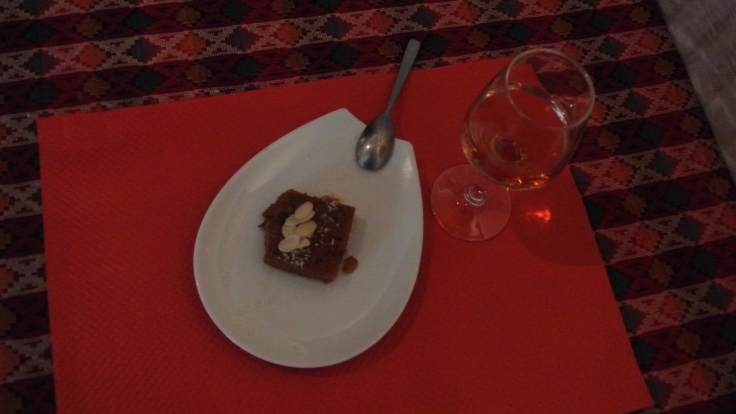
The song Nepal ki chori hu ma, I’m Nepal’s daughter, is playing. I can envision too easily a girl with long tresses dancing in delight mouthing those words on a green hill. I wonder if Anita considers going back to Nepal permanently.
For me life is a journey. I don’t know where I’m going to be or where I’m going to go. But wherever that is Nepal and being Nepali is something that I hold in my heart.
Anita excuses herself, ‘ to go and practice with the children’ while Hitler-ji chats to me about what he believes Nepal needs.
People need to be taught. How to be clean. How to be good citizens from the time they are children. The problem in Nepal is that politicians should be like parents, teaching, guiding. But they are not. The country as we look at it now is just being filled with temples, one for each of our gods, taking up space. One god is good enough, no? Our country will not develop through the building of temples. We should follow what Buddha said, ‘don’t put me up somewhere, keep me in your mind.’
As we talk, more people come in pouring in. Children. Aunts. Mothers. I excuse myself, and proceed to the rounds of hugging, the customary two kisses on the cheek known as ‘la bise’, and naamasteeing.
I leave the restaurant, the door closing on more than three generations of francophones, francophiles, Nepalese, Nepalophiles, Newars, Newarophiles…
As I make my way past the top of the slope, I can’t help but feel this is the work of destiny, of its deft hands stitching our countries, our places, our past, present and futures together, just as delicately as Anita sewed the dhaka table clothes.
With nostalgia.
With love.
With hope.
Thank you Anita, Roman, Hitler-ji, Tirtha Sobha-ji and Felix for trusting me with your inspiring story. It has been a real pleasure and an honor to be able to listen in.
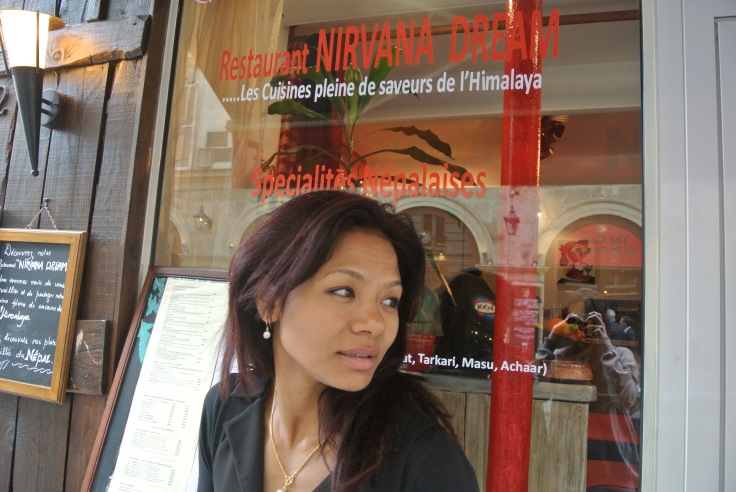
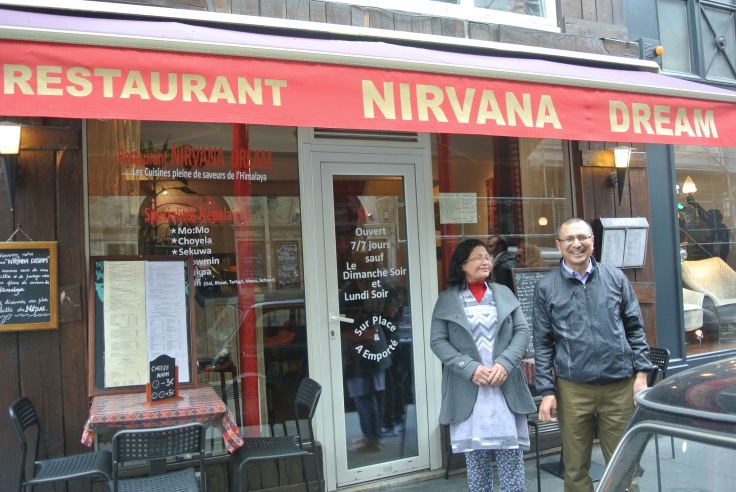
Thank you also to Philippe Hainault, the Nirvana Dream Enterprise Loan Manager, for sharing the story of this beautiful establishment.
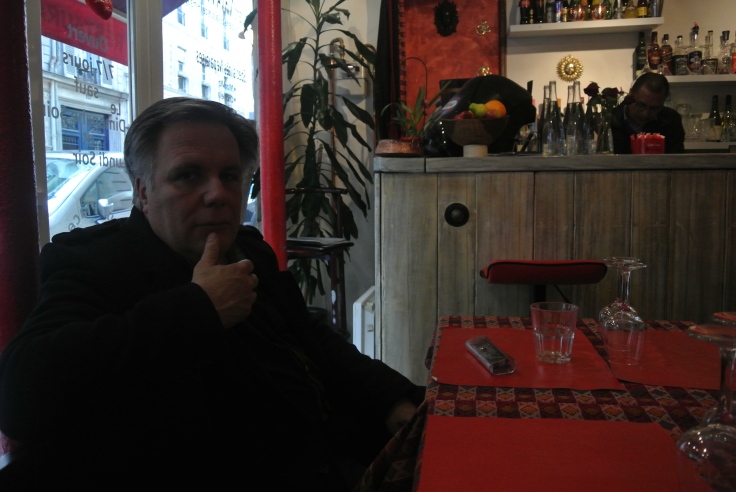
* Nirvana Dream is located at metro St Georges, 42 rue St Georges, 75009 Paris, France. Check it out and give your own reviews on Trip Advisor.
